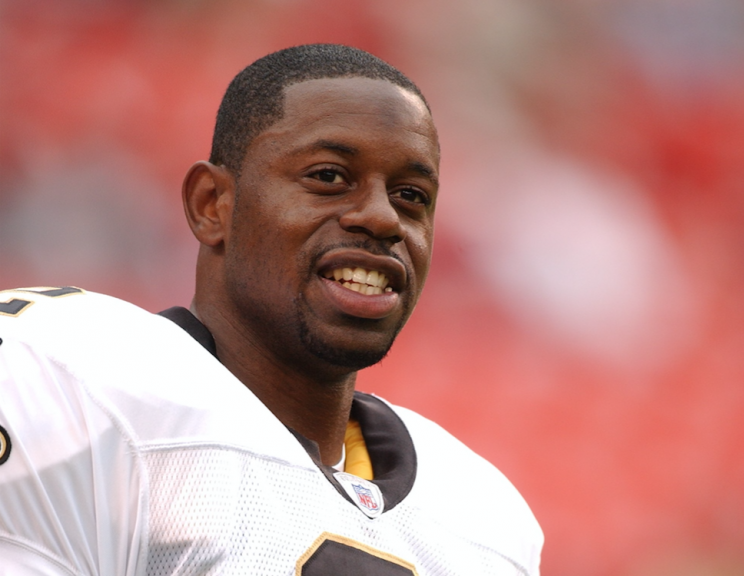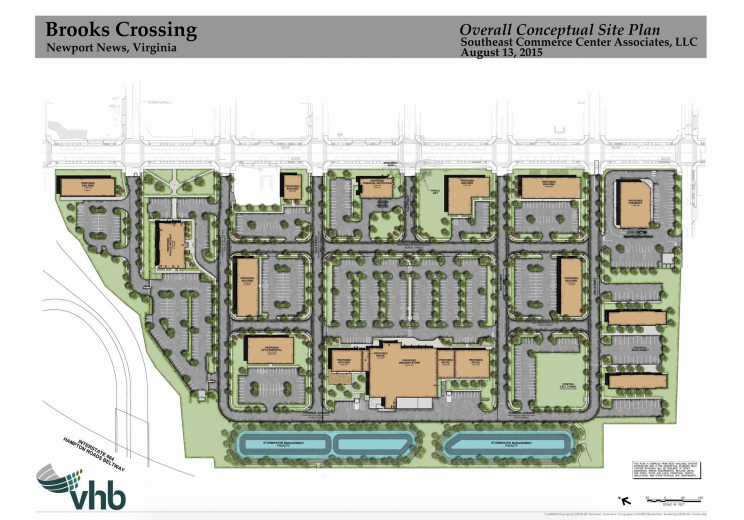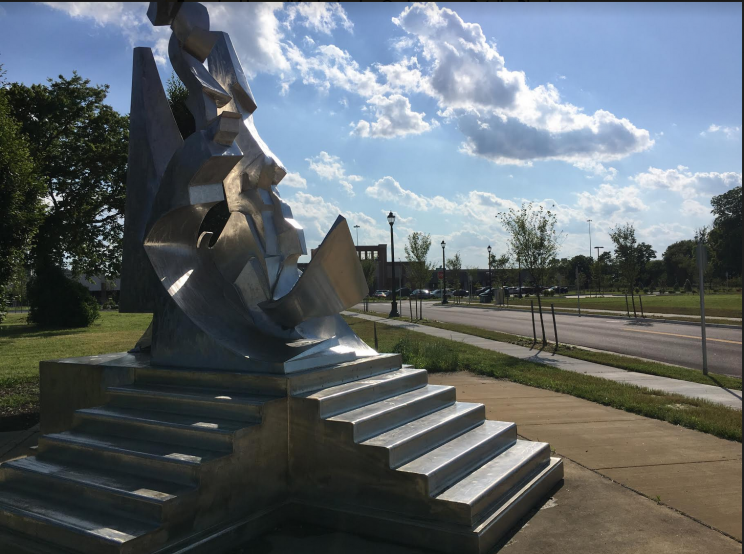Aaron Brooks brings life back to his hometown with development bearing his name
NEWPORT NEWS, Va. — Watching your hometown crumble behind you is beyond heartbreaking. But helping to bring your hometown back to prominence? That’s a special kind of reward.
Aaron Brooks grew up in southeast Newport News, running its streets and playing in its parks. And now, after a memorable stint as a state-hero quarterback and a respectable run in the NFL, Brooks is back to help shepherd a multimillion-dollar revitalization effort that could transform an entire community. Brooks Crossing, the new retail-and-residential development that bears his name, isn’t just a means of furthering his goals as a developer; it’s a way to give back to the community that gave him his start.
“It’s full circle for me,” says Brooks, a member of the Saints’ Hall of Fame. “I want to lift people up in the community, to give them opportunity, to give their kids and grandkids opportunity.”
Newport News, tucked in between the not-quite-small town of Williamsburg and the cosmopolitan Norfolk, is an industrial community with a population of 187,000. It’s home to significant heavy industry, including Newport News Shipbuilding, and it’s a heavily developed city — so much so that city officials are attempting to work backward and clean up areas, like southeast Newport News, suffering from blight and crime.

Brooks’ memories of Newport News in the ‘70s and ‘80s are tinged with nostalgia. He grew up playing baseball, football and basketball in Anderson Park with the Chesapeake Bay in the background, keeping busy from sunup to sundown while older kids kept the younger ones in line. The area, known as Hampton Roads, boasted phenomenal athletic talent at the time; Allen Iverson attended high school just a few miles away, and Brooks taught his young cousin, a kid by the name of Michael Vick, the nuances of football. “It was a good time for us,” he says, “a very community-based, family-oriented environment. We were in public housing. We didn’t have much, but it felt like we had everything.”
Whether Brooks is remembering his childhood as a little too rosy is irrelevant; what’s indisputable is that times changed, and the character of southeast Newport News changed with them.
“Drugs took over the community,” Brooks says. “We didn’t have gangs, but we did have people coming in from out of state dealing drugs and starting shootouts.” Brooks’ brother got wound up in the drug scene, and his activities got the family kicked out of public housing.
Unlike most of his peers, though, Brooks had an escape route. His cannon arm, his fleet legs and his downfield vision got him into the University of Virginia in 1994. He took over the starting quarterback gig two years later, and for a short time he was Big Man On Campus (or “Grounds,” in UVA’s parlance). He guided the chronically underachieving Cavaliers to a brief stint in the top 10, and engineered the greatest comeback in school history: a 1998 victory over Virginia Tech where Virginia overcame a 29-7 halftime deficit to win 36-32. But every summer, he’d come back to Newport News, and he was stunned by what he saw — or, more specifically, didn’t see.
“I would come home and there was nothing for me or my friends to do,” he says. “I spent a lot of time going back and forth to UVA thinking about what I could do to improve the community.”
The Green Bay Packers drafted Brooks in the fourth round of the 1999 NFL draft, but Brooks never saw action behind Brett Favre. The Packers dealt him to New Orleans in 2000, and at that point, Brooks’ fortunes changed. Forced into the starting job in Week 12 after starter Jeff Blake went down with an injury, Brooks led New Orleans to its first playoff victory. He’d go on to set franchise records for both season and career touchdown passes, marks that would stand until a guy named Brees came along.
Brooks ended his career with a single, unremarkable, sack-filled season with the Oakland Raiders, and left the game in 2007 knowing that he needed to look beyond the flash and dazzle of the NFL. “It’s such a gladiator sport,” he says. “It’s always excitement, you’re always yearning for that fight. So for some people, it’s never done, even when it’s done. You get dependent on the sport itself. You keep going, living that lifestyle even though you’re not living that life. It can be a trap.”
So how do you escape that trap? “You’ve got to find something to do,” he says. “If you do it right, you have the opportunity to have a really good life.”
Rather than remaining engaged in football through announcing or coaching, Brooks decided to pursue real estate development, first in nearby Williamsburg, Va., and next, a bit closer to home. As Brooks was working his way through the NFL, Newport News officials were working their way through the thicket of bureaucracy, regulations, conflicting desires and financial realities necessary to revive the southeast portion of the city. The city’s Redevelopment Housing Authority focused on a particular stretch of Jefferson Avenue, a boulevard that had deteriorated into a desolate stretch of half-occupied industrial buildings, abandoned warehouses and weed-choked sidewalks.
Over the course of more than a decade, a fits-and-starts progression hampered by recession, Newport News’s Economic/Industrial Development Authority has purchased parcel after discrete parcel around Jefferson Avenue, in effect putting together the pieces of a puzzle that they intended to open for business. Newport News’ ports aren’t far away, and the initial plan was to develop the area as a light-industrial, warehouse-based zone to support the nearby ports. But local activists protested, and when the only grocery store in the area shut down, the city pivoted to more of a resident-focused approach.
Brooks began his development career creating an upscale subdivision in Williamsburg. He and the city of Newport News connected in 2008, sensing mutual opportunity in developing the area around Jefferson Avenue. For Newport News officials, experience didn’t matter so much as Brooks’ dedication … and his name. “We’d rather work with someone with a real strong vision and a real heart for the community than necessarily just a developer,” says Florence Kingston, Newport News EDA’s Director of Development.
Plus, having a former star quarterback in the mix doesn’t hurt promotional efforts. The city devised the name “Brooks Crossing” to serve as both honor and inspiration. “The community needs to celebrate some of the heritage of success that’s out there,” Kingston says.
Brooks understood the ways redevelopment from the ground up can transform a city. Hurricane Katrina hit New Orleans just before Brooks’ final season with the Saints. He watched as cities from San Diego to Houston to Atlanta revitalized downtrodden urban areas by investing more, and more important, investing well.
“Some people thought I’d just come in here, dump a bunch of millions of dollars, and voila, development appears,” Brooks says. “That’s not how it works. I was smart enough to understand that, and so I brought in a partner to help subsidize the costs.”

Brooks partnered with an established developer, Armada Hoffler, to help bring the project to light. And even so, it’s been a long, at times dispiriting journey.
“It’s been a grind, man,” Brooks says. “It’s a huge challenge. But this is a necessity for the community to be productive, to create a conducive environment to give people some hope.”
Brooks has been at this for eight years, plowing time and money into the project. He won’t disclose how much money he’s spent to date, but he’s more than willing to acknowledge the time. “I-64 is my office,” he laughs, referring to the highway that connects Newport News with his home in Richmond 90 minutes away.
So what drives him? What keeps him working on Brooks Crossing, even when he’s had the chance to walk away? “I quote-unquote ‘made it,’” Brooks says. “I went to a great university, I was successful in my career, I was very fortunate. But I would come back and see that there was nothing to do, that generations of families were just lost. There was no one looking out for their best interests.”
At long last, the essentials are making their way to Brooks Crossing. The police precinct, which opened in January, and the grocery store, which opened in May, are now well-established. Local residents greeted the grocery store’s opening with gratitude and open shopping bags. “It’s really nice,” one resident, Pam Luster, told the Newport News Daily Press on the day of the store’s opening. “It’s been a long time coming, and I’m glad they are now a part of our community.”

Earlier this fall, a daycare center and a beauty supply store opened, further solidifying the retail footprint. The area boasts a public sculpture by noted artist Richard Hunt. And in one of the most significant developments, crews have broken ground on a Family Dollar, the first national tenant in the area.
Southeast Newport News, like many blighted areas, suffers from a wicked Catch-22: local retailers are hesitant to jump on board because no national brands have signed up, but national brands are hesitant because there aren’t any local retailers proving the viability of the community. Family Dollar could change that.
“We’ve needed a strong anchor, not just locally but nationally,” Kingston says. “We’ve had to sell our community that much more, spend a lot more dollars to convince people this is a prime location in which [retailers] can thrive, and there is a profit to be made.”
But even with Family Dollar moving in, the city estimates that it’s about only 20 to 25 percent done with Brooks Crossing. Plans now call for $48 million worth of public and private development of the 12-block section along Jefferson Avenue, a project that could take another decade to complete.
Down the line, Brooks plans to stay in the development business, but at his own pace. He’s looking at creating multifamily residential units, commercial properties, and the like. “I want to make a difference,” he says. “I’m not starving to make money. I’ve been so blessed with my wife and kids [twin boys and a daughter]. I’ve got a good life.”
But for now, there’s Brooks Crossing, and there’s the vision Brooks sees for what his hometown was, and could be again: “My aim is to put smiles on people’s faces when they’re enjoying life and what the world has to offer,” he says. “If I can make them feel like they’re elated with their life, and what they’ve done in their community, I feel I’ve done my job.”
More NFL on Yahoo Sports
____
Jay Busbee is a writer for Yahoo Sports and the author of EARNHARDT NATION, on sale now at Amazon or wherever books are sold. Contact him at jay.busbee@yahoo.com or find him on Twitter or on Facebook.

 Yahoo Nachrichten
Yahoo Nachrichten 

